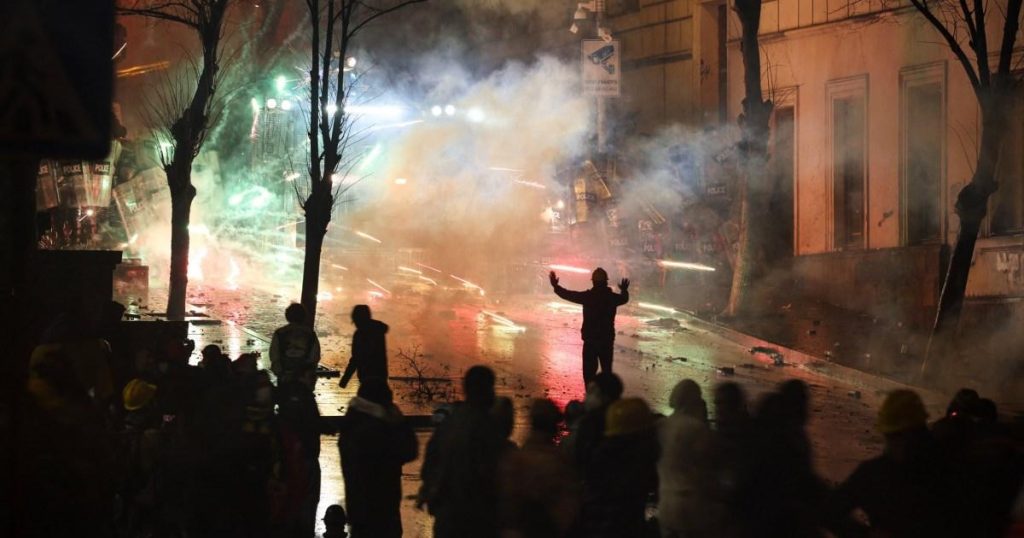Protests have spread across Georgia after the government decided to suspend negotiations to join the European Union. Demonstrators gathered outside parliament in Tbilisi for the fourth day, throwing stones and setting off fireworks. The ruling Georgian Dream party’s victory in the parliamentary election was seen as a referendum on Georgia’s aspirations to join the EU, sparking the protests. There are claims of election rigging with the help of Russia, as Moscow wants to keep Tbilisi in its orbit. Former Russian president Dmitry Medvedev stated that an ‘attempted revolution’ was taking place in Georgia, referencing similarities to the 2014 Ukrainian Maidan.
The Maidan protests in Ukraine from 2013 to 2014 led to significant changes in the country, including its current war with Russia. Georgia’s Interior Ministry reported that 27 protesters, 16 police officers, and one journalist were admitted to hospital during the recent protests. Prime Minister Irakli Kobakhidze warned protestors and denied that Georgia’s European integration had been halted. Georgia’s pro-Western president, Salome Zourabichvili, expressed concerns about her country becoming a ‘quasi-Russian’ state and accused the Georgian Dream Party of controlling major institutions. She called for new elections to ensure the will of the people is not misrepresented or stolen again.
Despite being granted candidate status by the EU in December 2023, Georgia’s accession has been put on hold after the passage of a law seen as limiting democratic freedoms. The country has been resisting Russian influence and demanding fair elections to protect its destiny. The protests in Georgia have led to clashes with police using tear gas and water cannons to disperse demonstrators. The situation is reminiscent of the Maidan in Ukraine, where protests led to significant political changes and brought the country into conflict with Russia. The EU’s decision to put Georgia’s accession on hold has added to the tension in the country and fueled the demands for new elections.
The protests in Georgia have intensified as thousands continue to take to the streets, calling for new elections and protesting against alleged election rigging. The government’s decision to suspend negotiations with the EU has sparked outrage among the demonstrators, with many accusing Russia of interference in Georgia’s internal affairs. The situation has led to injuries on both sides, with protestors, police officers, and a journalist being admitted to hospital. The EU’s decision to cut financial support to Georgia following the passage of a restrictive law has further inflamed the situation, with the country’s president warning against Russian influence and calling for fair elections to protect the will of the people.
The protests in Georgia have raised concerns about the country’s direction and its relationship with Russia. The parallels with the Maidan in Ukraine have heightened fears of a potential conflict and further political upheaval. The calls for new elections and demands for fair representation reflect the deep divisions within Georgian society and the high stakes involved in the country’s path towards European integration. The government’s response to the protests and the accusations of election rigging have further fueled the unrest, with tensions escalating on the streets of Tbilisi. The international community will be closely watching developments in Georgia as the country navigates through this challenging period of political instability and uncertainty.











